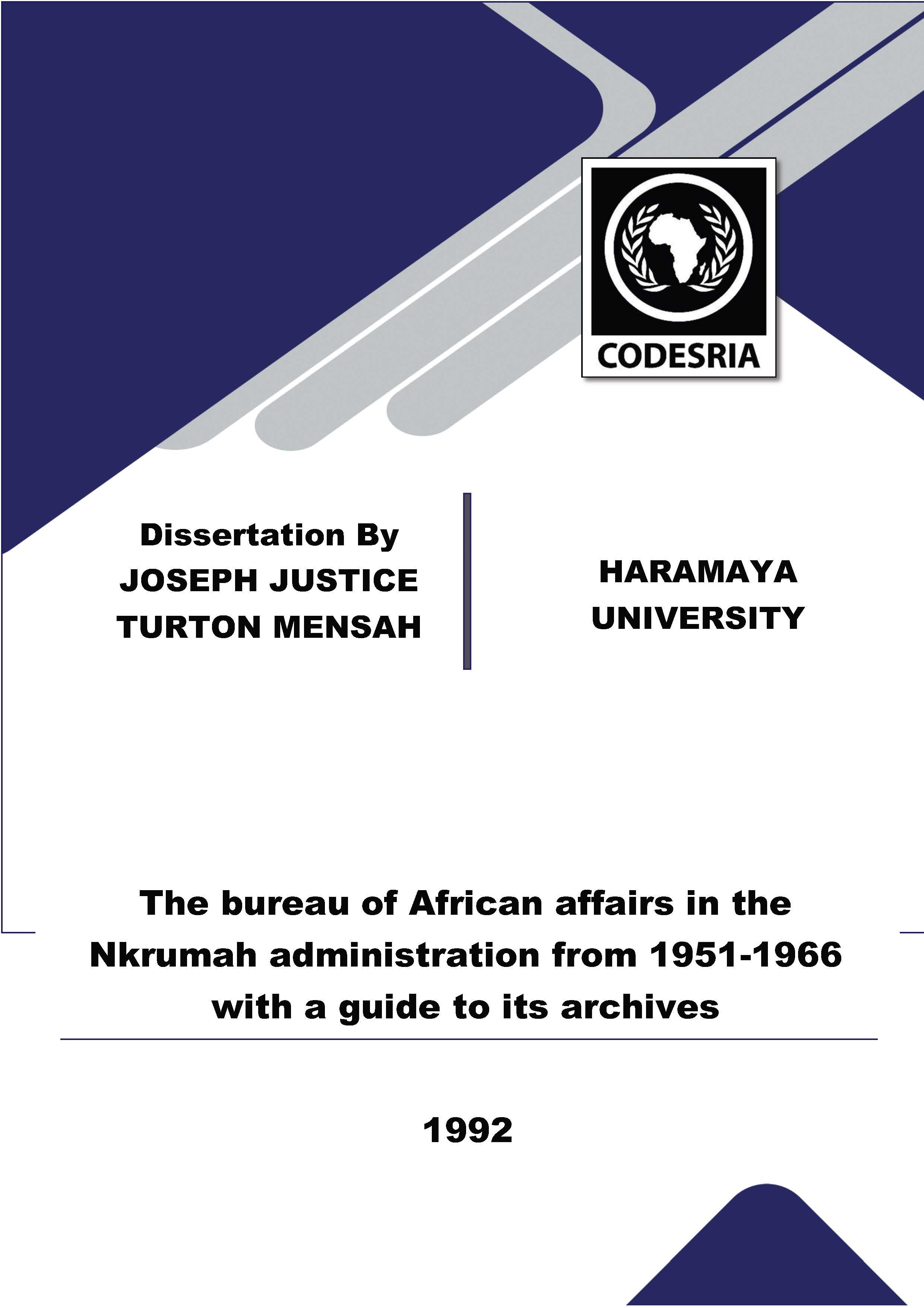The bureau of African affairs in the Nkrumah administration from 1951-1966 with a guide to its archives
Mots-clés :
African affairs, Nkrumah administration, archivesSynopsis
The events that took place in Africa under the Bureau of African Affairs may be said to have been motivated by the realisation that new states of Africa though independent, were constrained by the international environment, but that within those constraints (and others dictated by physical resources and human capabilities), there remained a degree of choice for African leaders to fashion their governments' policies to meet the continental demands. Consequently Kwame Nkrumah established the Bureau of African Affairs in order to expedite the fulfilment of the pan-African dream for the achievement of the total liberation of Africa from alien rule and domination and the enhancement of the dignity of the black man anywhere in the
world. strictly speaking this study is not just another thesis on Kwame Nkrumah. Rather, it is a study of a almost forgotten, but nonetheless important political institution established under his administration in pursuit of his African objectives.
Téléchargements
Références
BZFEDO (Borana Zone Finance and Economie Development Office), 2010. Physical andsocio-economic profile ofYabello district ofBorana zone (Unpublished), Yabello, Ethiopia.
Conway, D., C. Mould and W. Bewket, 2004. Over one century of rainfall and temperature observations in Addis Ababa, Ethiopia International Journal of Climatology, 24:77-91.
Cooper, P.J.M., J. Dimes, K.P.C. Rao, B. Shapiro, B. Shiferaw and S. Twomlow, 2008. Coping better with current climatic variability in the rain-fed farming systems of sub-Saharan Africa: An essential first step in adapting to future climate change? Agriculture, Ecosystems and Environment 126:24-35.
Coppock D. L., Getachew Gebru, Salomon Desta, Sintayehu Mesele and Seyoum Tezera, 2008a. Are cattle· die-offs predictable on the Borana plateau? Global Livestock Collaborative Research Support Program, Research Brief 08-02-PARIMA, December 2008, Addis Ababa, Ethiopia
Coppock, D. 1994. The Borana plateau of southem Ethiopia: synthesis of pastoral research,development and change, 1980-91 International LivestockCenter for Africa, Addis Ababa.
Helland·, J., 2001. Participation and govemance in the development of Borana: Southern Ethiopia. In M.A. Mohamed Salih, T.Dietz and M.A. Abdel Ghaffar (Eds). "African pastoralism: Conflict, institutions and government". Pluto Press, USA.
Herrero, M., C. Ringler, J. van de Steeg, P. Thomton, T. Zuo, E. Bryan, A. Omolo, J. Koo andA. Notenbaert, 2010. Kenya: Climate variability and climate change and their impacts on the agricultural sector. Report submitted to the World Bank, Washington, D.C.
Homann, S., 2004. Disturbed traditional resource management affects the preservation of the Borana cattle in their original habitat. Ethiopian Journal of Animal Production, 4(1): 33-44
Homann, S., B. Rischkowsky and J. Steinbrach, 2007. The effect of development intervention on the use of indigenous range management strategies in the Borana lowlands in Ethiopia. Land Degradation and
Development, Doi: I 0.1002/ldr.845
Nori, M. and J. Davies, 2007. Change ofwind or wind of change? Climate change, adaptation and pastoralism, IUCN, Nairobi 2007, Prepared for the World Initiative for Sustainable Pastoralism.
Notenbaert, A. Mudel, J. v. Steeg and J. Kinyangi. 2010. Options for adapting to climate change in Iivestock dominated farming systems in the greater horn of Africa. Journal of Geography and Regional Planning, 39:234-239, Available online at http://www.academicjournals.org/JGRP
ONRS (Oromia National Regional state), 2011. Program of plan on adaptation to climate change, February 2011, Finfinnee.
Onyango, L., J. Mango, S. Desta, S. Tezera, Z. Kurui, B. Wamubeyi, A. Mohammed, A. Fatuma, 2012. Village baseline study: Site analysis report for Yabello - Borana, Ethiopia (ET0106). CGIAR
Research Program on Climate Change, Agriculture and Food Security (CCAFS), Copenhagen, Denmark. Available online at: www.ccafs.cgiar.org
Orindi, V., A. Nyong, and M. Herrero, 2007. Pastoral livelihood adaptation to drought and institutional interventions in Kenya. Human Development Report Office, Occasional Paper 2007/54.
United Nations Development Programme UNDP, New York, USA.
Oxfam, 2011. Briefing on the Horn of Africa Drought: Climate change and future impacts on food security, August 2011.
Pachauri, R., 2004. Climate change and its implications for development: the role of IPCC assessments. Development Study, IDS Bulletin 1(35): 11.






